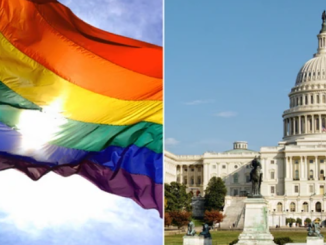
Navy members who intentionally “misuse” transgender service members’ pronouns are in violation of the Navy’s harassment policy and could face administrative or judicial action, a Navy official told American Military News on Thursday.
Captain Dave Hecht, a public affairs officer at Chief of Naval Personnel, told American Military News via email that the “intentional misuse of transgender service member pronouns is inappropriate and inconsistent with the Navy zero tolerance policy on harassment.”
“Violations of regulation or law, to include failure to comply with the UCMJ [Uniform Code of Military Justice], may be punishable by administrative or judicial action,” Hecht said.
Hecht said that the Navy “appreciates that pronouns are a part of individual identity” and that both civilian and uniformed Navy members are expected to use appropriate rank or title, pronounce names correctly and use “an individual’s pronouns consistent with their gender marker in DEERS or as reflected in an exception to policy (ETP) for that individual.”
DEERS is a database that contains information for active-duty, retired and reserve service members and their families, as well as civilians and others who are entitled to health care benefits. Hecht said exceptions can be approved “to permit real-life experience (RLE) in a work environment and pronoun use would align with the preferred gender in that case.”
A Navy instructional video quietly posted online last month to the Defense Visual Information Distribution Service (DVIDS) revealed that troops are being trained on gender pronouns and “inclusive language.”
In the video, a pair of service members say Navy personnel should try to create a “safe space for everybody” by using “inclusive language,” like saying “hey everyone” or “hey team” instead of the common phrase “hey guys.”
When asked if a Navy member can be punished for using language like “hi guys” rather than “inclusive” language like “hi team,” Hecht said the Navy “does not mandate formulaic language for its members,” but it does set “the expectation of respect and dignity by and for its Sailors and civilians.”
“Navy guidance in such cases focuses on intentional misuse of terminology. As such, intentional misuse of such terms is inappropriate and inconsistent with the Navy zero tolerance policy on harassment,” Hecht explained. “Violations of regulation or law, to include failure to comply with the UCMJ, may be punishable by administrative or judicial action.”
Hecht said the Navy has “a culture of respect for all of its members, both civilian and uniformed,” and asserted that the service’s pronouns policy exists “in furtherance of this culture of respect.”
“The UCMJ prohibits provoking speeches or gestures, conduct that is of a nature to bring discredit upon the Armed Forces or is prejudicial to good order and discipline, maltreatment, and failure to obey lawful orders and regulations,” Hecht added.
* Article from: American Military News


